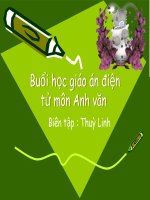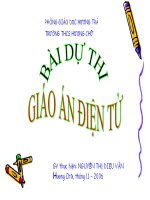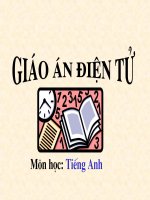Unit 4 Our past
Bạn đang xem bản rút gọn của tài liệu. Xem và tải ngay bản đầy đủ của tài liệu tại đây (205.61 KB, 24 trang )
<span class='text_page_counter'>(1)</span>Date of teaching: 26-30/9/2016 Class: 8A5, 8A7 Week: 7 Period: 21 UNIT 4: OUR PAST Lesson 1:. Section: Getting Started - Listen and Read 1-2-3 (p.p.38+39). I. OBJECTIVES: 1. Knowledge: Introduce, leading to the topic of a unit. Read the dialogue about the life of Vietnamese people many years ago. a. Grammar: 1. past simple tense 2. Used to b. Vocabulary: Some words to talk about folktale in the conversation. 2. Skills: Listening - Reading 3. Attitude: By the end of the lesson, a. Sts will be able to tell the activities people used to do in the past. b. Sts will be grateful and remember their ancestors. II. PREPARATION: 1. Teacher: - Prepare lesson carefully: (teaching aids, make lesson plan by power point, book, laptop, sound) 2. Students: -Learn previous lesson by heart. -Prepare new lesson at home: (write new words; read text; translate the text into Vietnamese; answer questions) III. STEPS FOR TEACHING: 1. Check old lesson: (5’) - Write some new words about household chores. - Make questions with “Why” for the following sentences. 8A5 I was late this morning because I didn’t set the alarm clock last night. He cooked dinner himself because his mother got home late. 8A7 I study English because I want to communicate with foreigners. The children stopped laughing because they saw the teacher. 2. New lesson: (40’). Stage. Steps/Activities. Work.
<span class='text_page_counter'>(2)</span> Arrangement GETTING STARTED: - Ask Sts to look at the picture on page 38 and write the names of the things that do not belong to the past. Answer: Warm-up (5’). - The TV - The radio. Group work. - The lighting fixture - The mobile phone - Modern clothing (shirt, pants) - School uniforms - The stereo Vocabulary: - Ask Sts to list the things their grandparent did in the past. - Teach Sts new words. Presentation (10’). live on a farm: sống ở nông trại stay home: ở nhà help my mom: giúp mẹ look after: chăm sóc cook the meals: nấu ăn clean the house: lau nhà wash the clothes: giặt đồ the sounds like: nghe có vẻ hard work: công việc cực nhọc electricity: điện năng a modern equipment: thiết bị hiện đại light-lit-lit the lamp: thắp, đốt đèn tell story: kể chuyện. Whole class.
<span class='text_page_counter'>(3)</span> an old folktale: chuyện cổ tích traditional: truyền thống Great grandma: bà cố (explain by drawing a chart of family) Once: ngày xưa (Once upon a time) - Get Sts to repeat the words including - Ask some Sts to stand up and say the new words. Individually. Checking: What and where - Write each word on the blackboard inside a circle. Rub out. Whole class. tie words one - by - one. T / F statement prediction - Ask Sts to read the statements (on poster) and predict they are true or false. Sts write T if it is true and F if it is false.. Individually. a. Nga is used to live on a farm. b. Nga’s grandma didn’t get to school. c. She has an easy and happy life when she was young. d. There wasn’t any modern equipment at her time. e. “The lost shoe” is a short story. - Ask Sts to read the dialogue between Nga and her Grandma and check their prediction. - Ask them to correct the false statements. - Give feedback. a.. Guess Answer Correction F Grandma used to live on farm.. b.. T. c.. F. She had a hard life.. Individually.
<span class='text_page_counter'>(4)</span> d. T a. I used to live on a farm. e. F b. There wasn’t any electricity. F O X It is an old folk tale. X. c. Mom had to do everything without X -Ask Sts to listen to and repeat the conversation, then practice the help of modern equipment. with their partners. d. My father used to tell us stories. X and answer questions. - T asks Sts to work in pairs, ask e. The best one was the lost shoe. X to live? Practice a. Where did Nga's grandmother use f. Traditional stories are great. X (10’) She used to live on a farm.. Pair work. Pair work. b. Why didn't she go to school? Because she had to stay at home and help her Mom to look after her younger brothers and sisters. c. What did Nga's great Grandma do? She used to cook the meals, clean the house and wash the clothes. d. What did Nga's great grandmother and great grandfather do after dinner? Her great grandma used to light the lamp and her great grandfather used to tell stories. e. What did Nga's ask her grandma to do at the end of the conversation? She asked her grandma to tell her the tale "The lost shoe". - Give feedback. Open pairs Closed pairs. - Ask them to work in open pairs and closed pairs Fact or opinion - Have Sts read the statements part 3 on page 39 and decide which a fact is and which an opinion is.. Individually.
<span class='text_page_counter'>(5)</span> Production (10’). - Survey. Pair work Did you use to… - get up late.. Name. Yes/No. - ride bicycle too fast. - go to school late. - eat too much candy. -forget to do your homework. - Give feedback:. - Give feedback. - Ask Sts some questions to check. “Who used to get up late/ride bicycle too fast, ect. …?” Free-Practice (3’) Homework (2’). - Ask Sts to write the result of their survey. - Ask Sts to say about what they used to do by working in pair. Example: I used to get up late. - Learn the new words by heart. - Prepare Unit 4: our past SPEAK.. DRAWING EXPERIENCE _________________________________________________________ _________________________________________________________ _________________________________________________________. Individually. Pair work Individually.
<span class='text_page_counter'>(6)</span> Date of teaching: 03-07/10/2016 Class: 8A5, 8A7 Week: 8 Period: 22 UNIT 4: OUR PAST Lesson 2:. Section : SPEAK 1-2 (p.40). I.. OBJECTIVES: 1. Knowledge: Develop speaking skill. Speak about the way things used to be and the way they are now. a. Grammar: 1. past simple tense 2. Used to b. Vocabulary: Some words to talk about folktale and the past. 2. Skills: Speaking: Speaking about the way things used to be and the way they are now. 3. Attitude: By the end of the lesson, a. Sts will be able to use USED TO talk about the things they used to do. b. Sts will know how to conserve their past as well as respect and love their grandparents and parents more than they have done. II. PREPARATION: 1. Teacher: - Prepare lesson carefully: (teaching aids, make lesson plan by power point, book, laptop, sound) 2. Students: - Learn previous lesson by heart. - Prepare new lesson at home: (write new words; read text; translate the text into Vietnamese; answer questions) III. STEPS FOR TEACHING: 1. Check old lesson: (5’) Write some new words of lesson 1 Say some things they did in the past using “used to + Vo” 2. New lesson: (40’) Stage. Steps/Activities Jumbled words:. Warm-up (5’). - Electricity. - rieletcicty. - Entertainment. - menttaenterin. Work Arrangement Pair work.
<span class='text_page_counter'>(7)</span> - Market :. - rkmaet. - Supermarket. - permasuekrt. - Building. - liidugnb. - T asks to work in group and discuss the differences between the past and now. - T recalls the conversation between Nga and her grandma.. Group work Individually. - T asks Sts to answer the Teacher’s questions +"Where did Nga's grandma always live?" "She always lived on a farm." +Another word for “always lived" "Used to live" "She always lived on a farm"& “She used to live on a farm.” - T asks Sts to read through the conversation and list sentences using “used to + Vo” Usage of “used to + Vo: từng, đã từng” Presentation (10’). To express a past habit or an action usually happened in the past. Example: - When David was young, he used to swim once a day. - I used to smoke a packet a day but I stopped two years ago. - I used to drive to work but now I take the bus. Form: (+) S + used to + Vo. Whole class. Ex: I used to get up late.. (-) S + didn't use to + Vo Ex: I didn’t get up early. (?) Did + S + use to + Vo? + Yes, I did. + No, I didn’t. Ex: Did you use to get up late? Yes, I did. Word cue drill: a. Live / Hue / Hanoi - Did you use to live in Hue? - No, I didn’t. I used to live in Hanoi.. Individually.
<span class='text_page_counter'>(8)</span> b. Have / long hairs / short hairs - Did you use to have long hairs? - No, I didn’t. I used to have short hairs.. Individually. c. Get up/ late / early - Did you use to get up late? - No, I didn’t. I used to get up early. Practice (10’). d. Walk to school / bicycle - Did you use to walk to school? - No, I didn’t. I used to go to school by bicycle. e. Study / evening / early morning. - Did you use to study in the evening? - No, I didn’t. I used to study in the early morning. Differences between the past and now. - T compares 2 pictures on page 40, using "USED TO" to talk about the actions in the past. - T elicits some ideas so that Sts can talk about them. a. Where did they live in the past? And now? - People used to live in small houses. Now they live in big. Production (10’). houses and tall buildings. b. How did they travel? - People used to walk. Now, they can go by cars or motorbikes. c. What's about the electricity? - People used to light the lamp. Now, there is electricity everywhere. d. What's about their life / work? - People used to work hard all the time. Now they have a lot of time for entertainment. e. Did children use to go to school? Most children used to stay at home. Now, they all go to school.. Individually.
<span class='text_page_counter'>(9)</span> f. What's about their entertainment? - Children used to play traditional games such as hide and seek, skip rope... outdoors. Now, they have a lot of modern games-video games. Correct the mistakes: - T asks Sts to underline mistakes and correct them.. Individually. 1. My sister uses to play tennis a lot but she doesn’t play very often now. 2. What do you use to do when you felt afraid? 3. Rick left class early because he used to have a headache. - T asks Sts to write about the things you used to do last year Free-Practice Last year, I used to get up late. Now, I get up early and do. Individually. morning exercises…. (3’) Consolidation - T reminds Sts of the past simple tense by asking Sts to remember and write in your notebook. (2’). Individually. Homework (1’). - Practice talking about the differences between the past and the present. - Prepare Unit 4 LISTEN. DRAWING EXPERIENCE _________________________________________________________ _________________________________________________________ _________________________________________________________ Date of teaching: 03-07/10/2016 Class: 8A5, 8A7 Week: 8 Period: 23 UNIT 4: OUR PAST Lesson 3: I. OBJECTIVES: 1. Knowledge: Develop listening skill.. Section: LISTEN. (p.41). Individually.
<span class='text_page_counter'>(10)</span> Listen and further practice in Past Simple Tense. a. Grammar: 1. past simple tense 2. Used to b. Vocabulary: Some words to talk about folktale and the past (lay, collect, discover). 2. Skills: Listening: Listen to monologues/ dialogues within 100-120 words for general or detailed information 3. Attitude: By the end of the lesson, a. Sts will be able to understand the main idea of a story by listening and further practice in Past Simple Tense. b. Sts will be happy with what they have and don’t be foolish and greedy. II. PREPARATION: 1. Teacher: -Prepare lesson carefully: (teaching aids, make lesson plan by power point, book, laptop, sound) 2. Students: -Learn previous lesson by heart. -Prepare new lesson at home: (write new words; read text; translate the text into Vietnamese; answer questions) III. STEPS FOR TEACHING: 1. Check old lesson: (5’) Write some new words. Write 2 sentences using “used to” 2. New lesson: (40’) Stage. Steps/Activities - T asks Sts to work in group and list the old folktales they. Work Arrangement Whole class. have read. + The Hundred-Knot Bamboo (Cây Tre Trăm Đốt) + The Man In The Moon (Chú Cuội) + Earth Cakes, Sky Cakes (Bánh Chưng, Bánh Giày) Warm up (5’). + The Story of Tấm and Cám (Tấm Cám) + An Tiêm and The Watermelon (Sự Tích Mai An Tiêm) + The Starfruit Tree (Sự Tích Cây Vú Sữa) - Ask Sts to match verbs (simple present form and simple past form). Individually.
<span class='text_page_counter'>(11)</span> Run. Ran Flew Lived Ate Shout. Fly Live Eat. Look Lay Light Go Decide Discover Pre-Listening (10’). Shouted Looked Laid Lit Went Decided Discovered. 1. Vocabulary:. Whole class. - comfortable: thoải mái - lay - laid – laid: đẻ trứng - discover: khám phá - a gold egg: trứng vàng - excitedly: hào hứng, hứng khởi - amazement: sự ngạc nhiên - cut open: mổ bụng - unfortunately: xui thay - foolish: ngu ngốc - greedy: tham lam Checking: Rub out the meaning in Vietnamese and ask Sts to fill in again in 2 minutes. 2. Prediction: Predict the moral lesson of the story - T asks Sts to look at four choices in the book (p.41) and guess which is the most suitable to the story. a. Don't kill chickens.. Individually.
<span class='text_page_counter'>(12)</span> b. Don't be foolish and greedy. c. Be happy with what you have. d. It is difficult to find gold. - T has Sts to listen to the tape twice and check their. Individually. prediction. Answer : " Don't be foolish and greedy" * Tape transcript:. Whole class. Once a farmer lived a comfortable life with his family. His chicken laid many eggs which the farmer used to buy food and clothes for his family. One day, he went to collect the eggs and discovered one of the chickens laid a gold egg. He shouted excitedly to his wife: "We're rich”! His wife ran to him and they both looked at the egg in amazement. The wife wanted more, so her husband decided to cut open all the chickens and find While-Listening more eggs. Unfortunately, he couldn't find any egg. When (10’). he finished, all the chickens were died. There were no more eggs of any kind for the foolish farmer and his greedy wife. - T asks Sts what tense is used in the story (Simple Past Tense). - T has Sts listen again and try to write as many verbs as possible. The student who writes more verbs gets good marks. Answers: - went. - were. - discovered. - ran. - laid. - looked. - shouted. - wanted. Individually.
<span class='text_page_counter'>(13)</span> - finished. - decided. Individually. - T asks Sts to give the infinitives of these verbs - T asks Sts to answer T’s questions and T gives the correct answers at once.. Individually. - couldn't. Post-Listening (10’). - T plays the tape the 3rd time. 1. How did the farmer live with his family? +The farmer lived a comfortable life with his family. 2. What did the farmer sell the eggs for? + He sold eggs to buy food and clothing. 3. How did the farmer and his wife feel when they saw the gold egg? +They were very happy when they saw the gold egg. 4. How many gold eggs did they get after killing the chickens? + They couldn't find any egg. - T corrects the choice (a, b, c, d) in the textbook. -T asks some Sts to tell the story again and give the lesson from this story.. Group work. - T can help if necessary. Consolidation (3’) Homework (2’). - Say about ten things you did yesterday.. Individually. - Write twenty irregular verbs on the notebooks - Practice talking about the differences between the past. and the present. - Prepare Unit 4 READ. DRAWING EXPERIENCE _________________________________________________________ _________________________________________________________ _________________________________________________________ Date of teaching: 03-07/10/2016. Individually.
<span class='text_page_counter'>(14)</span> Class: 8A5, 8A7 Week: 8 Period: 24 UNIT 4: OUR PAST Lesson 4: Section – READ 1- 2 (p.p. 41+42) I. OBJECTIVES: 1. Knowledge: Read the story "The lost shoe" for details. a. Grammar: 1. past simple tense 2. Used to b. Vocabulary: Some words to talk about folktale and the past. 2. Skills: Reading - Listening 3. Attitude: By the end of the lesson, a. Sts will be able to understand and retell the story "The lost shoe". b. Sts will try to be a good person, and work hard like Little Pea. II. PREPARATION: 1. Teacher: - Prepare lesson carefully: (teaching aids, make lesson plan by power point, book, laptop, sound) 2. Students: - Learn previous lesson by heart. - Prepare new lesson at home: (write new words; read text; translate the text into Vietnamese; answer questions) III. STEPS FOR TEACHING: 1. Check old lesson: (5’) Rewrite these sentences, using “used to” 8A5 In 2000s, they listened to ballad melody before going to bed. I played jigsaw puzzle when I was a small boy. 8A7 April comes before January in the dictionary. I lived on a farm once, but I don’t any more. 2. New lesson: (40’) Stage. Steps/Activities Brainstorming: Name some folk tales that you have read. Cây tre trăm đốt. Tấm Cám. (one hundred-section Warm up. Hoàng tử ếch. (The frog Prince). bamboo) The folk tales. Work Arrangement Whole class.
<span class='text_page_counter'>(15)</span> (5’) Đôi hia 7 dặm. Bạch Tuyết và 7 chú lùn). (seven-mile shoes) (Snow White and 7 dwarfs) - T uses techniques such as mine, realia and translation to introduce the new words.. Whole class. Vocabulary: - cruel (adj.) - upset (adj.) Pre-Reading (10’). - fairy (n) - magical (adj.) magically (adv.) - rag (n) - fall in love with (translation) - immediately (adv.) Checking: ROR - T rubs out the meaning in Vietnamese and asks Sts to fill in again in 2 minutes. - T sticks the poster of T/F statements on the board. - T asks Sts to work in pairs to guess which statements are true, which are false and then share with their partners.. Individually. Whole Class Pair work. T / F statement predictions a. Little Pea's father is a poor farmer. b. Her father got married again after his wife Died. c. Her new mother was beautiful and nice to her. d. She worked hard all day. e. She didn't have new clothes to take part in the festival. - T has Sts read the story "The Lost Shoe"on p.41 and check their prediction and ask them to correct the false statements. Guess Answer a. T While-Reading. b.. T. c.. F. Correction. Her new mother was cruel to her.. Individually.
<span class='text_page_counter'>(16)</span> d.. T. e. F A fairy gave her beautiful clothes. Comprehension questions. Pair work. - T asks Sts to work in pairs answering the questions in exercise 2 on p.42. a. Who was Little Pea? - She was a poor farmer’s daughter. b. What did Stout Nut's mother make Little Pea do all day? - She made her do the chores all day. c. How did Little Pea get her new clothes? - Before the festival started, a fairy appeared and magically changed her rags into beautiful clothes. (10’). d. Whom did the Prince decide to marry? Why? - He decided to marry Little Pea because the shoe (which the Prince was keeping) fitted her. e. Is it a true story? How do you know? - (Sts answer themselves) Gap filling: Complete the sentences with words from the story.. Pair work. - T asks Sts to work in pairs, fill in the blanks with suitable words from the story. Answer: a. Little Pea's father was a farmer. b. Little Pea 's mother died when she was young. c. Little Pea had/used to do housework all day after her father got married again.. Pair work. d. The prince wanted to marry/choose a girl from Little Pea’s village. e. Stout Nut’s mother did not make new clothes for Little Pea. f. The Prince found Little Pea’s lost shoe. Retell the story: - T asks Sts to work in pairs, telling the story again in. Pair work.
<span class='text_page_counter'>(17)</span> details. They can look at the statements in the gap filling exercise and add more. Post-Reading (10’). Homework (3’). E.g. "Little Pea’s father was a poor farmer. Unfortunately, Little Pea’s mother died when she was very young and her father got married again. The new wife was very cruel to her and made her work all day. One day, the Prince wanted to choose a wife from her village. Her new mother didn't make new clothes for her, but the fairy did. She came to the festival and lost a shoe. The Prince found her shoe and decided to marry her. - Rewrite the story. - Read the passage and do the exercises again, practice telling the story. - Prepare Unit 4 WRITE. DRAWING EXPERIENCE _________________________________________________________ _________________________________________________________ _________________________________________________________ Date of teaching: 10-14/10/2016 Class: 8A5, 8A7 Week: 9 Period: 25 UNIT 4: OUR PAST Lesson 5: I. OBJECTIVES: 1. Knowledge: a. Grammar:. Section:. WRITE 1-2 (p.p. 42+43). 1. past simple tense 2. Used to b. Vocabulary: Some words to talk about folktale and the past. 2. Skills: a. Writing: Writing a short imaginary story. Pair work. Individually.
<span class='text_page_counter'>(18)</span> b. Reading: Reading the story for details. 3. Attitude: By the end of the lesson, a. Sts will be able to use Simple Past Tense to write a folk tale. b. Sts will know how to use the wisdom to deal with their problem smartly. II. PREPARATION: 1. Teacher: Prepare lesson carefully: (teaching aids, make lesson plan by power point, book, laptop, sound) 2. Students: - Learn previous lesson by heart. - Prepare new lesson at home: (write new words; read text; translate the text into Vietnamese; answer questions) III. STEPS FOR TEACHING: 1. Check old lesson: (5’) Write the past simple form of some irregular verbs Rewrite these sentences, using “used to” 8A5 In 2000s, they listened to ballad melody before going to bed. I played chess when I was a small boy. 8A7 I played chess when I was a small boy. I lived on a farm once, but I don’t any more. 2. New lesson: (40’) Stage. Steps/Activities Chatting: stories.. T asks Sts some questions about imaginary. Work Arrangement Whole class. Questions: Warm up (5’). Do you want to read imaginary stories? Name some of them. Which story do you like best? Have you ever read the story "How the tigers got his Stripes" ? Vocabulary: - Burn (v) : /bə:n/ cháy, bị đốt - Leave (v) : /li:v/ rời khỏi, để lại - Escape ( v) : /is'keip/ trốn thoát - Tie (v) : /tai/ trói, buộc - Appear (v) : /ə'piə/ xuất hiện - Master (n): /'mɑ:stə/ ông chủ. Whole class.
<span class='text_page_counter'>(19)</span> - Wisdom (n) : /'wizd m/ trí khôn, trí tuệ - Rope (n) : /roup/ dây thừng - Bring (v): /briɳ/- brought: mang tới - Straw (n): /strɔ:/ rơm, rạ - a stripe (n): /straip/ sọc, vằn - to graze (v): /greiz/ gặm cỏ Checking: Matching. Whole class. - T writes the new words in the list on the left-hand side of the blackboard. - T rubs out the meaning in Vietnamese and asks Sts to fill in again in 2 minutes.. Teacher. - Sts go to the board and fill the meaning in. - T asks Sts the meanings of the verbs in the box. Pre – Writing (10’). - T has them work in pairs using suitable verbs to fill in the blanks. Answers:. Individually Pair work. 1. appear. 6. tied. 2. as. 7. lit. 3. said. 8. burned. 4. left. 9. escaped. 5. went - T asks Sts to work in groups of four, answering the following questions: Questions: a. Where was the man? b. What did the buffalo do when the tiger appeared? c. What did the tiger want to know? d. What did he do before going home? Why? e. What did he do when he returned? Answers:. While-Writing. a. He was in his field. b. It grazed nearby. c. The tiger wanted to know why the strong buffalo was the servant and the small man was the master. d. He tied the tiger to a tree with rope because he didn’t want it to eat the buffalo. e. When he returned, he lit the straw to burn the tiger.. Group work.
<span class='text_page_counter'>(20)</span> (10’). Write the story: - T asks Sts to imagine being a man in order to write the story.. Individually. - T gets Sts to change: The man – I His – my - T gets Sts to write individually then share with their partners and correct mistakes. - T takes some writings to correct in front of the class. Suggested description: One day, as I was in a field and my buffalo grazed nearby, a tiger came. It asked why the strong buffalo was my servant and I was its master. I told the tiger that I had something called wisdom. The tiger wanted to see it but I said that I left the wisdom at home that day. Then I tied the tiger to a tree with a rope because I didn’t want it to eat my buffalo. I went to get some straw and I burned the tiger. The tiger escaped, but today it still has black stripes from the burn. Tell the story. Individually. Team work. * Divide the class into 2 teams. Team A plays the role of the tiger. Team B plays the role of the buffalo. They work in team, telling the story. Post-Writing (10’). * Ask a volunteer from each team to tell the story in front of the class. * Team tiger changes: a/ the tiger I * Team buffalo changes: a / the buffalo I. Team work. Tell the story without textbooks Write the story again, imagine you are: Consolidation (3’) Homework (2’). The tiger The buffalo - Write the story again; imagine you are the tiger / the buffalo.. Whole class. - Write the story at home.. Individually. - Prepare Unit 4: LANGUAGE FOCUS.. DRAWING EXPERIENCE.
<span class='text_page_counter'>(21)</span> _________________________________________________________ _________________________________________________________ _________________________________________________________ Date of teaching: 10-14/10/2016 Class: 8A5, 8A7 Week: 9 Period: 26 UNIT 4: LANGUAGE FOCUS Lesson 6: (p.p.44+45) I. OBJECTIVES: 1. Knowledge: Develop reading and writing skill. Further Practice in past simple, prepositions of time and USED TO. a. Grammar: 1. past simple tense 2. Used to b. Vocabulary: Some words to talk about folktale and the past. 2. Skills: Writing Further Practice in past simple, prepositions of time and USED TO 3. Attitude: By the end of the lesson, Sts will be able to use past simple, prepositions of time and USED TO (to talk about the action that always happens in the past). II. PREPARATION: 1. Teacher: - Prepare lesson carefully: (teaching aids, make lesson plan by power point, book, laptop, sound) 2. Students: - Learn previous lesson by heart. - Prepare new lesson at home: (write new words; read text; translate the text into Vietnamese; answer questions) III. STEPS FOR TEACHING: 1. Check old lesson: (5’) - Write the past simple form of some irregular verbs - Write a sentence, using “used to” - Answer the question 8A5 Which subjects did you have yesterday? 8A7 What did you do last weekend? 2. New lesson: (40’).
<span class='text_page_counter'>(22)</span> Contents. Steps/Activities I. Warm up:. In. January. Matching:. On. 3 p.m. - T writes some prepositions in a list on the left-hand side of the blackboard.. At. November 1997. Between. July 2nd. - T writes the time/date/ month ….on the right hand of the board.. After/before 6 a.m 7a.m and 9a.m. - T divides the class into two teams: team Ateam B.. feedback:. Wednesday. In. January. In. November 1997. On. July 2nd At. On. Wednesday. - Team A uses red chalk, team B uses yellow chalk.. At. 6a.m. Between. 7a.m and 9a.m. - The team that draws more lines that are correct will win the game.. After/before. 6 a.m. Activity 1:. Ex1:. - T reviews the past simple tense and forms of the verb.. Answer:. - T asks 2 volunteers from each team to come to the board to match the items on the left with those on the right by drawing a line connecting them.. a. ran. - T asks Sts to write the past simple form of the b. flew verb given below. c. took - T calls on some Sts to go to the board and d. went write their answers. e. had. f. did g. was h. rode i. ate j. sat k. came. Activity 2: - T asks Sts to complete the dialog below and use the past simple.. Ex2: Answer: a. Lan: Did you eat rice for lunch? Nga: No, I ate noodles. b. Ba: How did you get to school? Nam: I rode the bicycle to school..
<span class='text_page_counter'>(23)</span> c. Minh: Where were you yesterday? Hoa: I was at home. d. Chi: Which subject did you have yesterday? Ba: I had Math. Activity 3:. Ex3:. - T introduces the task and asks students to do ex3 on p.44 individually then compare with their individual partners.. Answer:. Activity 4:. a. I’ll see you on Wednesday. b. I’m going to Laos in January. c. We must be there between 8.30 and 9.15 d. The bank closes at 3 p.m if you arrive after 3 p.m, the bank will be closed. e. I’ll be home before seven because I want to see the seven o’clock news. Ex4:. - T asks Sts to do exercise 4 on p.45. Dialogue: - T has Sts work in pairs, looking at 4 pictures on p.45; using USED TO with the verbs “live – Nga: Where is it? It isn’t Hanoi. stay – have- be” to complete the dialogue Hoa: No, it’s Hue. I used to stay there. between Nga and Hoa. Nga: Is that you, Hoa? Hoa: Yes, I used to have long hair. Nga: Who is in this photo? Hoa: That is Loan. She used to be my next door neighbor. Nga: Are they your parents? Hoa: They’re my aunt and uncle. They used to live in Hue, too. Further practice: - T reads aloud some sentences and asks Sts to listen carefully and try to find out the mistakes. When they hear a mistake, they stand up and say No then correct it.. Sentences with mistakes 1. I usually stay at home in Sunday. 2. My father used to play football when he has spare time. 3. She used live in Hanoi. 4. My parents will arrive in 3 o’clock. He was born in June the third..
<span class='text_page_counter'>(24)</span> DRAWING EXPERIENCE _________________________________________________________ _________________________________________________________ _________________________________________________________. Bình An, ngày….tháng…năm 2016 DUYỆT CỦA BGH. TỔ TRƯỞNG CM. LÊ QUỲNH NGA.
<span class='text_page_counter'>(25)</span>









